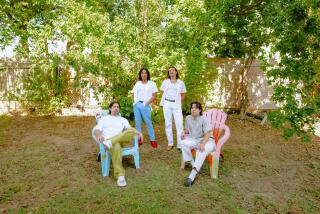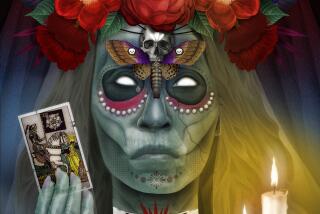Goth-metal’s Italian envoys
- Share via
Rock success is always a kind of miracle, a surprise ending to a series of unlikely events, years of hard work and impossible luck. And for any metal band raised in northern Italy, the idea of crossing over to audiences in Europe and the U.S. was so unlikely that hardly anyone indulged in the fantasy.
That has begun to change with the rise of Lacuna Coil, a goth-metal act out of Milan, where the local cult following for metal is deeply committed but very small, and not enough to support the humble living of a young Italian hard-rock star. Pop and dance music dominate the clubs and airwaves, an ironic situation in the likely birthplace of the mano cornuta, the “devil’s horns” sign that reigns supreme as the salute of the heavy metal multitudes.
But Lacuna Coil’s newest album, “Karmacode,” is already a hard-rock hit at home and in America, entering Billboard’s Top-200 pop albums chart earlier this month at a promising No. 28. And the band is now playing to sold-out shows of as many as 3,000 people a night as part of a six-week tour with Rob Zombie, which lands in Los Angeles on Monday for two nights at the Wiltern LG.
“It was something that surprised everybody,” says Andrea Ferro, whose male vocals share the spotlight with singer Cristina Scabbia. “In Italy, everyone is talking about it because it’s something that never really happened before.”
Italian business magazines are even writing about Lacuna Coil, seeing the band as a new national export, examining the band’s slow rise since forming in 1996. The signs were already encouraging with the U.S. release of the band’s 2002 album, “Comalies,” which ultimately sold 250,000 copies here and became the top-selling album for the Hawthorne, Calif.-based Century Media Records.
Lacuna Coil expects to have a busy year in 2006, returning for a second stint on the Ozzfest tour, and appearing on the main stage before headliners Ozzy Osbourne and System of a Down.
“When we started back in ‘96, we basically wanted to play the music that we liked,” says Ferro. “Everything was very naive. We never expected to reach this kind of level, or even to be one day professional or living off the music. It’s so new and so fresh, we’re happy about the little things.”
The six-person band was co-founded a decade ago by Ferro and bassist Marco Coti-Zelati, who have been friends since they were 12-year-olds riding skateboards in Milan. During winter months, skateboards were put away as the two dabbled in increasingly hard rock, which became a serious obsession as they grew older. By 1997 they had met Scabbia and asked her to sing background vocals on their demo tape, but the blend of her voice with the vocals of Ferro was intriguing enough for them to ask her to join the band as a lead singer.
The group’s earliest songs were heavy with death-metal grunts, but eventually it found its own sound of brooding melody, male and female vocals, and heavy guitars that evoke darkness and angst, but also more hope than bitterness. And in a genre often dominated by growling men with shaved heads and skull tattoos, the band’s following inevitably owes something to the striking looks of singer Scabbia. As a young woman, she commands much of the media attention, appearing on the covers of various metal magazines. Revolver magazine recently put her on the cover of an issue dedicated to “the hottest chicks in metal.”
“They probably think they can get better attention this way,” Scabbia says. “It’s better than a drunk guy on the cover, if you think about it.”
Scabbia is not uncomfortable with the attention, but she insists that she and Ferro are equal partners, with complementary roles in the band.
“We just look at our vocals like two instruments you can add to every song,” she says. “We don’t care who’s singing more, who’s singing less, who’s singing what. Sometimes I can be the most aggressive part, other times I can be the mellow one. We don’t really like to have roles.”
The band’s first appearance on the Ozzfest tour in 2004 was a kind of career milestone, as the band discovered new fans lined up for Lacuna Coil autograph sessions following each day’s quick 20-minute set on the festival’s second stage. It was there, during 26 dates across America, that the members of Lacuna Coil witnessed the U.S.’s eclectic hard-rock audience.
“It was a very mixed-up crowd,” says Ferro. “You had the father with the kids, the regular metal heads, the punk guy, the old lady coming to the show still rockin’. We noticed in America, the rock-metal population is very wide. It’s not only 16-year-old metal guys.”
That’s of some help to a band with aspirations to tackle big themes, such as the conflict between technology and simpler comforts explored on “Karmacode.” But like other acts on that tour, autograph sessions also meant Lacuna Coil was frequently asked to not just sign photos and T-shirts, but various exposed body parts.
“I signed a lot of boobs as well,” Scabbia says with a laugh. “I think it’s something that is becoming really normal. I don’t even see any sexual meaning when someone gets boobs signed. It becomes a classic.”
More to Read
The biggest entertainment stories
Get our big stories about Hollywood, film, television, music, arts, culture and more right in your inbox as soon as they publish.
You may occasionally receive promotional content from the Los Angeles Times.











